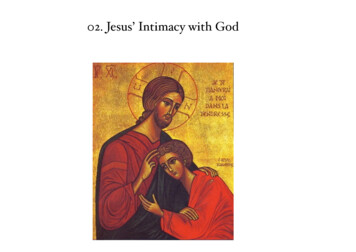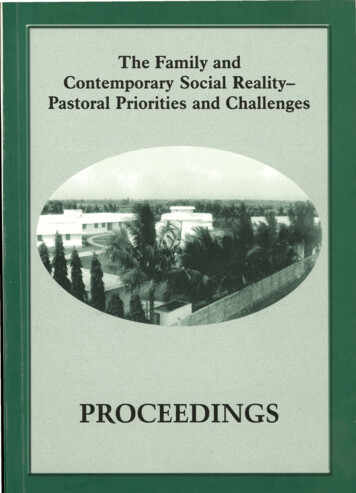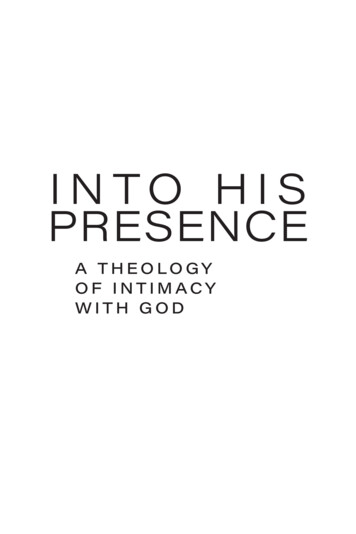
Transcription
SEARCH PROGRAMSJune 2005Topics subject to change without noticeJUNE 5 - INTIMACY WITH GOD, WHAT IS IT?Although the word "intimacy" does not appear in the King James Bible, thethought of an up-close walk with God does. Therefore it is necessary first to defineour theme.JUNE 12 - INTIMACY WITH GOD, HOW TO DEVELOP ITIntimacy with God is sometimes viewed as an alternative to "sound doctrine" or"dead orthodoxy." It has resulted in spiritual anarchy in the religious world, bywhich man is exalted and God is trivialized. Let's learn the Lord's way for a closerwalk with Him.JUNE 19 - INTIMACY WITH GOD THROUGH WORSHIPWorship is drawing near to God. God has appointed times for the assembly of allbelievers to draw near to him as a community or fellowship of His people. Tobelievers it is not a celebration, but the most sacred hour of the week.JUNE 26 - INTIMACY WITH GOD BY A FAITHFUL LIFEThere is an obvious need in today's world for a better understanding of theharmony of keeping God at a distance and drawing nearer to God. Let's see.
In Search of the Lord's Way"INTIMACY WITH GOD, WHAT IS IT?"John 17:1–3As we approach the beginning of a new century—and even a new millennium—we’re surelythankful for much of what we’ve been blessed in this century. Through the development and growth ofscience and technology, the industrialized world is enjoying living conditions far, far above anythingour foreparents could ever have dreamed about. In fact, probably more of them than we’ll ever knowwere like my father, who hearing his first radio and seeing his first television, said of each of them,“They’ll never perfect it; it’ll never work.”But with a hundred years of extraordinary human achievement has come also the devaluationof God. Being so totally surrounded with all this “stuff” we’ve made for ourselves, God has becomerather irrelevant, hasn’t He? With the recent cloning of an animal and now so much talk about cloninghumans, God seems to be even less important. All this materialism has made a closer walk with Goddifficult, to say the least, and even the church is found minimizing God.These messages are not intended to be a rebuke to anybody, but an effort to restore ourrespect and reverence for God, and to exalt Him and strengthen Him in our spiritual family andnational lives.The word intimacy is not found in the King James Version of the Bible. It’s possible there was nosuch word in the English language when the King James Version was translated in 1611. However, it is aword now—a very legitimate word—in common use today; therefore it does appear in some of themodern English translations.That points up a legitimate need for modern speech translations. Some television viewers havewritten me and asked why we need new translations. Well, this is one reason. I wouldn’t venture aguess how many new words were added to our English dictionaries just last year alone. We’ll be usingthese new words to express old thoughts about—well, just about everything, including our faith in Godand in Christ. This is not an endorsement of all modern versions, of course not. And I pray you won’ttake it as such. But since some of the English words used four hundred years ago are no longer incommon use—someone has given me a list of some five hundred such words, probably there aremore—and since we’re constantly coining new words to express those thoughts, it’s helpful to have areliable, and I stress, a reliable translation of God’s word in the vocabulary currently in use.The dictionary defines intimacy as “the state of being intimate.” Of “intimate,” it says:Belonging to or characterizing one’s deepest nature: marked by very close association marked by awarm friendship through long association: suggesting informal warmth or privacy: of a verypersonal or private nature (Webster’s New Collegiate Dictionary).To a lot of people, that defines a sexual relationship. It would certainly include it, all right, but itcould hardly be that exclusively. But look, that’s what the Bible is saying in Genesis 4:1: “And Adamknew Eve his wife; and she conceived, and bare Cain.” Now this isn’t Adam’s first introduction to Eve.That had already taken place, and we’ll return to it later. But here he knew her intimately—sexually—and she conceived. The same idea is in Genesis 4:25: “And Adam knew his wife again; and she bare ason, and called his name Seth.” That “intimacy” is sexual. In some daytime talk shows a guest might beasked, “Were you intimate?” meaning, of course, did you have sexual relations?And despite the fact that some people deny it—even some theologians—that’s exactly thesituation in Sodom in Genesis 19:1–11 when the Scripture says,6/5/2005INTIMACY WITH GOD, WHAT IS IT?1
In Search of the Lord's WayThe men of Sodom, compassed the house [Lot’s house] round, both old and young, all the peoplefrom every quarter: and they called unto Lot, and said unto him, Where are the men which came into thee this night? bring them out unto us, that we may know them (Genesis 19:4–5).Don’t let yourself be deceived into believing these men were the welcoming committee fromthe chamber of commerce come to know or get acquainted with Lot’s guests. They wanted a sexualknowledge—what’s sometimes called carnal knowledge—of these men, and since they refused toaccept Lot’s daughters instead, it’s clearly obvious they wanted a homosexual relationship. This is thesin of Sodom that God calls “grievous” in Genesis 18:20 for which He utterly destroyed the city. Sothat’s one aspect of intimacy in the Scriptures.There’s another kind of intimacy in the Bible, too. It’s found in Genesis 2 in the creation story.When all the animals which God had made were brought before Adam, he gave them names. Butamong them all, there was no suitable helpmate found for Adam. So it’s said in Genesis 2:21,The Lord God caused a deep sleep to fall upon Adam, and he slept: and he took one of his ribs, andclosed up the flesh instead thereof; and the rib, which the Lord God had taken from man, made hea woman, and brought her unto the man. And Adam said, This is now bone of my bones, and fleshof my flesh: she shall be called Woman, because she was taken out of Man. Therefore shall a manleave his father and his mother, and shall cleave unto his wife: and they shall be one flesh.That’s an intimate relationship—the most intimate human relationship we’ll ever know.In Ephesians 5:22–33 the Holy Spirit uses this “one flesh” intimacy to teach us another kind—avery, very close relationship between Christ and His church. He says,Wives, submit yourselves unto your own husbands, as unto the Lord. For the husband is the headof the wife, even as Christ is the head of the church: and he is the saviour of the body. Therefore asthe church is subject to Christ, so let the wives be to their own husbands in every thing. Husbands,love your wives, even as Christ also loved the church, and gave himself for it; that he might sanctifyand cleanse it with the washing of water by the word, that he might present it to himself a gloriouschurch, not having spot, or wrinkle, or any such thing, but that it should be holy and withoutblemish. So ought men to love their wives as their own bodies. He that loveth his wife lovethhimself. For no man ever yet hated his own flesh; but nourisheth and cherisheth it, even as theLord the church: for we are members of his body, of his flesh, and of his bones. For this cause shalla man leave his father and mother, and shall be joined unto his wife, and they two shall be oneflesh. This is a great mystery: but I speak concerning Christ and the church. Nevertheless let everyone of you in particular so love his wife even as himself; and the wife see that she reverence herhusband.The idea of intimacy with God is nothing new. It’s taught in the Scriptures. I believe that is whatis meant in Genesis 3:8 when it’s said, “And they [Adam and Eve] heard the voice of the Lord Godwalking in the garden in the cool of the day.” I must admit I don’t comprehend all that says, but Ibelieve the Holy Spirit is conveying the idea of a very warm, close, intimate fellowship for which Godcreated man, and which existed between Him and His offspring (Acts 17:28–29), prior to thetransgression, which relationship is restored when man is reconciled to God by Jesus Christ (2Corinthians 5:17–19).But intimacy has been talked up for a long time in some theological circles as an alternative towhat some have called “dead orthodoxy” and more recently others have dubbed “legalism.” It’s anescape from “sound doctrine” as we read in 2 Timothy 4:3 and other passages. It’s a kind of superspirituality that’s founded, not on the word of God, but that grows out of what feels like a super6/5/2005INTIMACY WITH GOD, WHAT IS IT?2
In Search of the Lord's Wayexperience with God, which has resulted in the (1) trivialization of God, (2) abandonment of thedoctrines of the atoning and mediatorial works of Christ, (3) rejection of biblical authority, (4)desertion of real Christianity, and has resulted in further fragmentation of believers into super-sects.But what we’re encouraging in this study of intimacy with God, as we also expose the dangersand pitfalls of which we’ve just spoken, is a person’s genuine, Bible-based, close-up knowledge of God,a genuine nearness to God as the Holy Spirit compares it to the closeness of the husband-wiferelationship. It’s a closer walk with God, what David, the shepherd-boy-become-king said in the greatlyloved Twenty-third Psalm:The Lord is my shepherd;I shall not want.He maketh me to lie down in green pastures:He leadeth me beside the still waters.He restoreth my soul:He leadeth me in the paths of righteousness for his name’s sake.Yea, though I walk through the valley of the shadow of death,I will fear no evil: for thou art with me;Thy rod and thy staff they comfort me.Thou preparest a table before me in the presence of mine enemies:Thou anointest my head with oil;My cup runneth over.Surely goodness and mercy shall follow me all the days of my life:And I will dwell in the house of the Lord for ever.We’re saying what the apostle Paul is saying in the New Testament:What things were gain to me, those I counted loss for Christ. Yea doubtless, and I count all thingsloss for the excellency of the knowledge of Christ Jesus my Lord: for whom I have suffered the lossof all things, and do count them but dung, that I may win Christ . . . That I may know him, and thepower of his resurrection, and the fellowship of his suffering, being made conformable unto hisdeath (Philippians 3:7–10).And what he wrote to Timothy:I know whom I have believed, and am persuaded that he is able to keep that which I havecommitted unto him against that day (2 Timothy 1:12).And again in 2 Timothy 4:16–18:At my first answer no man stood with me, but all men forsook me: I pray God that it may not belaid to their charge. Notwithstanding the Lord stood with me, and strengthened me; that by me thepreaching might be fully known, and that all the Gentiles might hear: and I was delivered out of themouth of the lion. And the Lord shall deliver me from every evil work, and will preserve me unto hisheavenly kingdom: to whom be glory for ever and ever.It’s what John is saying in 1 John 1:3:That which we have seen and heard declare we unto you, that ye also may have fellowship[partnership, join-participation, communion] with us: and truly our fellowship is with the Father,and with his Son Jesus Christ.And it’s what Jesus Himself was talking about in prayer the night before His crucifixion:Father, the hour is come; glorify thy Son, that thy Son also may glorify thee: as thou hast given himpower over all flesh, that he should give eternal life to as many as thou hast given him. And this is6/5/2005INTIMACY WITH GOD, WHAT IS IT?3
In Search of the Lord's Waylife eternal, that they might know thee the only true God, and Jesus Christ, whom thou hast sent(John 17:1–3).It’s the closer walk with God that we sing about,O Master let me walk with TheeIn lowly paths of service free;Tell me Thy secret; help me bearThe strain of toil, the fret of care.Or—When we walk with the LordIn the light of His Word,What a glory He sheds on our way!While we do His good will,He abides with us still,And with all who will trust and obey.And—There is a place of quiet rest,Near to the heart of God,A place where sin cannot molest,Near to the heart of God.And another—Nearer, still nearer, close to Thy heart,Draw me, my Savior, so precious Thou art;Fold me, O fold me close to Thy breast,Shelter me safe in that haven of rest.Finally there’s that favorite of many, written by our beloved friend L. O. Sanderson, now deceased:Be with me, Lord—I cannot live without Thee,I dare not try to take one step alone,I cannot bear the loads of life, unaided,I need thy strength to lean myself upon.So what we’re talking about in these messages—about intimacy with God—is knowing God andliving in conformity with His will—the desirability of it and the dangers of it.Enoch is a name that’s familiar to most Bible readers basically for two reasons. First, he is one of onlytwo people of whom the Bible says, he “walked with God.” The other was Noah (Genesis 6:9).The second reason we remember him is that he walked so closely with God that he pleased God and hedidn’t die, for God just took him (Genesis 5:24). The New Testament book of Hebrews says of him,By faith Enoch was translated that he should not see death; and was not found, because God hadtranslated him: for before his translation he had this testimony, that he pleased God (Hebrews11:5).Enoch’s life, then, is a biblical example of intimacy with God. He lived close to God.His life was not one of austerity or contemplation, far removed from the interests and cares of theworld. It wasn’t that he joined a monastery and cut himself off from the rest of the world to walk withGod. His wasn’t a life without fault. Of course not, nor was Noah’s; they were men of like passions withus, as the Bible says of Elijah (James 5:17). But Enoch believed in God and it’s said of him that he6/5/2005INTIMACY WITH GOD, WHAT IS IT?4
In Search of the Lord's Way“pleased God,” meaning he obeyed God. The prophet Amos asked, “Can two walk together, exceptthey be agreed?” (Amos 3:3).Intimacy with God is knowing God up close, and the Holy Spirit says, “And hereby we do knowthat we know him, if we keep his commandments” (1 John 2:3). That makes sense, doesn’t it? How cana person say he knows God who doesn’t permit God to direct his ways? In the next verse He says, “Hethat saith, I know him, and keepeth not his commandments, is a liar, and the truth is not in him.” Oh,that’s strong language, but it’s the truth—straight from the Holy Spirit.My friend, how is it with you? Are you living and walking close to the Lord? Have you committed yourlife and your self to Him and His will? I certainly hope so, but we hear from television viewers everyweek who were not, who have now turned their lives around to do just that. If you haven’t alreadydone so, may I insist you do it today. Repent and be baptized into Jesus at once (Acts 2:38). Say, theLord’s way to live life is the best, the very best. Get to know God. He’ll be a blessing to you. He’s neverbeen known to be anything but a blessing. We love you.6/5/2005INTIMACY WITH GOD, WHAT IS IT?5
In Search of the Lord's Way"INTIMACY WITH GOD, HOW TO DEVELOP IT"John 14:1–10Knowing God! Knowing God intimately or up close! What an awesome thought that is! Or is it?Our twentieth century American society —even we in the church express little to no awe in the divinepresence, before whom every thought, every intention, every action of our lives is a matter of record!(Hebrews 4:12). What a loss! What a terrible and tragic loss we suffer for our irreverence. God forgiveus and have mercy on us.The prophet Isaiah wrote,In the year of King Uzziah’s death, I saw the Lord sitting on a throne, lofty and exalted, with thetrain of His robe filling the temple. Seraphim stood above Him, each having six wings; with two hecovered his face, and with two he covered his feet, and with two he flew. And one called out toanother and said, Holy, Holy, Holy, is the Lord of hosts, the whole earth is full of His glory. And thefoundations of the thresholds trembled at the voice of Him who called out, while the temple wasfilling with smoke. Then I said, “Woe is me, for I am ruined! Because I am a man of unclean lips,And I live among a people of unclean lips; for my eyes have seen the King, the Lord of hosts” (Isaiah6:1–5 NASB).Isaiah expressed the fear others in the Scriptures experienced when they were personallyconfronted with the immediate presence and holiness of God.The apostle Peter was one of Jesus’ intimate friends. He and James and John are sometimescalled the inner three. They were chosen to be with Jesus on some very special events where otherswere not included. On one occasion Peter and his friends had fished all night without success. In themorning Jesus borrowed his boat from which He preached to the multitudes assembled on the shoreof lake Galilee. When He had finished, He commanded Peter to launch out into the deep and let downthe nets for a catch.And Simon answering said unto him, Master, we have toiled all the night, and have taken nothingnevertheless at thy word I will let down the net. And when they had this done, they enclosed agreat multitude of fishes: and their net brake. And they beckoned unto their partners, which werein the other ship, that they should come and help them. And they came, and filled both the ships,so that they began to sink. When Simon Peter saw it, he fell down at Jesus’ knees, saying, Departfrom me; for I am a sinful man, O Lord (Luke 5:5–8).The aged apostle John exiled on Patmos for the word of the Lord wrote,I was in the Spirit on the Lord’s day, and heardbehind me a great voice, as of a trumpet . . . AndI turned to see the voice that spake with me . . .And when I saw him, I fell at his feet as dead . . .(Revelation 1:10–17).Very few people nowadays who profess an intimacy with God behave in the Divine Presence asdid Isaiah and Peter and John and others in the Bible. The god they know and worship and serve is notthat awesome. Their god is not one to be feared. They much prefer a god who is just one of us—a pal,a “locker room” friend, a buddy, or as an Australian would say, “a mate.” Many of us express more aweat the appearance of a favorite sports or music star or politician on a TV show than we do in thepresence of the one holy and true God. I’m not exaggerating. I’m simply stating a fact. There’s a reason6/12/2005INTIMACY WITH GOD, HOW TO DEVELOP IT1
In Search of the Lord's Wayfor it. Despite our boasting, we don’t really know God. At this point someone’s sure to quickly rejoin,“But I do know God!” Perhaps. However, I ask in all honesty, is it God you know, or an image of Him?We can know God because He has revealed Himself to us for that very purpose. But in ourattempt to know Him up close or intimately, we must strictly guard against two very grave dangers. Onthe one hand, there’s the danger that through a perceived holiness acquired by our own doings, wemay elevate ourselves to the level of deity. Some actually do that. They believe they are gods. On theother extreme, as an alternative to that, or as an escape from sound doctrine commonly called“legalism,” we may bring God down to our size, to be one of us. Many are they who do that. Let’s seethen how and how much of Himself God has revealed.First, Romans 1:18–21 says,For the wrath of God is revealed from heaven against all ungodliness and unrighteousness of men,who suppress the truth in unrighteousness, because that which is known about God is evidentwithin them; for God made it evident to them. For since the creation of the world His invisibleattributes, His eternal power and divine nature, have been clearly seen, being understood throughwhat has been made, so that they are without excuse (NASB).The invisible things of God are visible to those who will see, being reflected in the things Hecreated. There’s that popular psalm, too:The heavens declare the glory of God; and the firmament showeth his handiwork. Day unto dayuttereth speech, and night unto night showeth knowledge. There is no speech nor language, wheretheir voice is not heard. Their line is gone out through all the earth, and their words to the end ofthe world (Psalm 19:1–4).Secondly, God has revealed Himself through the person of His Son, Jesus Christ. The Gospel ofJohn focuses sharply on this aspect of the incarnation. For example, in John’s account of Jesus’ longand sometimes difficult controversy with the Pharisees over His deity, in chapter 8, verse 19, he quotesJesus as saying, “You know neither Me, nor My Father; if you knew Me, you would know My Fatheralso” (NASB).And in the passage we read at the beginning, John 14:1–10, Jesus had announced to Hisdisciples His imminent death and departure from among them. Naturally their hearts were heavy, soHe gave them the message of comfort found in John 14, 15, and 16. He began by saying (this time I’mquoting from the NASB), “Let not your heart be troubled;” He said, “believe in God, believe also inMe.” After promising He was going away to prepare a place for them, He said He would return forthem, to take them to that place. Then to dispel any wonder or doubts they had about where He wasgoing, He said,“And you know the way where I am going.” Thomas said to Him, “Lord we do not know where Youare going; how do we know the way?” Jesus said to him, “I am the way, and the truth, and the life;no one comes to the Father, but through Me. If you had known Me, you would have known MyFather also; from now on you know Him, and have seen Him.” Philip said to Him, “Lord, show usthe Father, and it is enough for us.” Jesus said to him, “Have I been so long with you, and yet youhave not come to know Me, Philip? He who has seen Me has seen the Father; how do you say,‘Show us the Father?’ Do you not believe that I am in the Father, and the Father is in Me?” (NASB).My friend, Jesus Christ is the way to the Father. He is the revelation of the truth of the Father.He is the way to life with the Father. No man knows or can know God apart from His Son Jesus Christ.So by knowing the life and teachings of Jesus, we can know God. In Hebrews 1:1–4 the Holy Spirit says,6/12/2005INTIMACY WITH GOD, HOW TO DEVELOP IT2
In Search of the Lord's WayGod, who at sundry times and in divers manners spake in time past unto the fathers by theprophets, hath in these last days spoken unto us by his Son, whom he hath appointed heir of allthings, by whom also he made the worlds; who being the brightness of his glory, and the expressimage of his person, and upholding all things by the word of his power, when he had by himselfpurged our sins, sat down on the right hand of the Majesty on high.Again in Colossians 1:15 He says of Christ, “Who is the image of the invisible God . . .” And againin verse 19, “For it pleased the Father that in him should all fullness dwell.” And once more in 2:9: “Forin him dwelleth all the fullness of the godhead bodily.” In Jesus Christ God came nigh to sinners. In HimGod became a man and walked among us.Thirdly, we can know God through the Scriptures. Jesus told those Pharisees we mentioned awhile ago to “search the scriptures; for in them ye think ye have eternal life: and they are they whichtestify of me” (John 5:39). If they had known Christ, they would have known the Father who had sentHim, and they could have known Him had they known their own Scriptures, because those Scripturestestified or gave witness to their Messiah, Jesus Christ.Those are the Scriptures which are said to be “the oracles of God.” The dictionary defines anoracle as “a person through whom a deity is believed to speak” or “a shrine in which a deity revealshidden knowledge.” In Acts 7:38 Stephen said of the Mosaic Law that it was “the oracles of God.” Paulspoke of “the oracles of God” with reference to all the written utterances of God through the OldTestament writers. In Hebrews 5:12, the oracles of God refer to the substance of Christian doctrine;and in 1 Peter 4:11, the idea is the utterances of God through Christian teachers. All that needs to beemphasized because there are so many people who profess an intimate knowledge of God through anexperience with Him, apart from the written word of God. And the more dramatic that experience, thegreater the intimacy is believed to be. That’s the popular understanding of “intimacy with God.”J. I. Packer says in his 1995 book, Knowing Christianity (page 16),All theology that moves away from the Scripture is basically trash, and one of the miseries of themodern church is that much of its literature, preaching, and thinking is so much trash at this point.What is called for now . . . is the humility which bows before the Scriptures and accepts them asinstruction from God. They are God preaching, God talking, God telling, God instructing, Godsetting before us the right way to think and speak about him. The Scripture are God showing ushimself: God communicating to us who he is and what he has done so that in the response of faithwe may truly know him and live our lives in fellowship with him . . . This Word is what the worldmust have if ever it is to know God. Thank God for it, then, and value and prize it.I couldn’t have said it better. (That’s one reason I quoted him.)We’ve talked about knowing God (1) through His revelation of Himself in the created world, (2)through His revelation of Himself in the person of Jesus Christ, and (3) through His revelation ofHimself in His oracles—the Scriptures. There’s this yet to be said, and I’ve kept it until now for areason.There is so much that needs to be said about it that we’ll have to address it more directly andfully later. It’s the rich fellowship we have with Him through faith. Now I’m not talking about the samething that some call experiential knowledge, that is, knowledge gained by experience apart from God’srevelations of Himself in creation, in His Son, and in the Scriptures. I’m talking about an acquaintanceand association the Christian has through an active faith in personal involvement with God in His divinepurpose and teaching. Faith is more than mere acceptance of a certain set teachings; it’s more thanconsent to the reality of a divine order—meaning God. It’s also an active involvement in that divine6/12/2005INTIMACY WITH GOD, HOW TO DEVELOP IT3
In Search of the Lord's Wayorder. “By faith Abel offered to God a better sacrifice than Cain” (Hebrews 11:4 NASB). “By faith Noah,being warned by God about things not yet seen, in reverence prepared an ark” (Hebrews 11:7 NASB).“By faith Abraham, when he was called, obeyed” (Hebrews 11:8 NASB). And the apostle, when he wastalking about his sufferings for Christ, said in 2 Timothy 1:12,For this reason I also suffer these things, but I am not ashamed; for I know whom I have believedand I am convinced that He is able to guard what I have entrusted to Him until that day (NASB).My friend, I’m talking about the kind of life you can live with God if you will by faith accept Hiswill, and obey Him in repentance and baptism for the remission of your sins, as He teaches in Acts 2:38.The person who believes he can live on an up-close friendship with God and do it separately from theteachings of His word, is doomed to disappointment. “Faith cometh by hearing, and hearing by theword of God” (Romans 10:17). God bless you, we love you.6/12/2005INTIMACY WITH GOD, HOW TO DEVELOP IT4
In Search of the Lord's Way"INTIMACY WITH GOD THROUGH WORSHIP"Titus 1:15–16They profess that they know God; but in works they deny him, being abominable, and disobedient,and unto every good work reprobate.Oh, that’s strong language! But it’s true. It must surely have been true when it was written andit’s obviously true today.There’s no doubt about it, for centuries some people have thought they enjoyed a special spacein God’s presence because of the good works they did, or do—their sacrifices or missionary work—orbecause of their absolute loyalty to the creed of some mainline orthodox church group, or because oftheir ascetic life—perhaps in some monastery. But from what I’m reading and hearing in the modernreligious media and from what I’m witnessing in the churches I visit, that isn’t the chief concern inchurches today. As a matter of fact, it’s the very opposite that’s most troubling. It’s the almost totalabsence of respect for God and the irreverent lack of awe in His holy presence, justified by a professionof a personal intimacy with Him.The current mania is what is viewed as an escape from traditional Christian belief and teachingand worship, by way of a dramatic experience with Him—apart from what the Scriptures themselvescall “sound doctrine.”If traditionalism has been the cause of religious division among professed Christians of pastgenerations, then individualism with its unlimited freedom, irreverence, spiritual anarchy, and itspaganism is that curse today. Lifting one’s self up to God’s level by good works and devotion to dogmato achieve a supposed intimacy with Him is not refuted by reducing God to one’s own level toaccomplish the same goal. It’s admittedly true that sound doctrine, as is mentioned in the letters toTimothy and Titus, has been badly abused by the profane and vain babblings of some teachers, whoconcerning the truth, have erred (2 Timothy 2:16–18). But it’s no mark of superior spirituality toabandon biblically defined sound doctrine in favor of an exhilarating personal experience with a godspecially invented to meet a person’s individual needs.The apostle John, who enjoyed the very closest relationship with Jesus Christ during His earthlyministry—he is known as one of the “inner three” of the apostles—wrote 1 John in which he said in theopening verses:That which was from the beginning, which we have
Intimacy with God is sometimes viewed as an alternative to "sound doctrine" or "dead orthodoxy." It has resulted in spiritual anarchy in the religious world, by which man is exalted and God is trivialize










